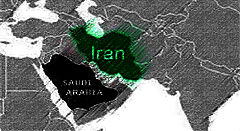General Jaafari: IRGC Will Take Harsh Revenge on the al-Saud
» Threat to Remove Saudi Arabia from the International System?
After ayatollah Khamenei’s remarks that Saudi Arabia would be dealt with in a “harsh and rough” way, the IRGC top commander Aziz Jaafari said “all possible potentials for Iran’s rapid and harsh response” and the “implementation of the will” of the supreme leader are ready and that he is awaiting the “execution order” of his boss.
Speaking at the Khatam-al-Anbia naval facility IRGC General Jaafari said, “The IRGC has made all the necessary preparations for Iran’s rapid and harsh response to fulfill the will of the supreme leader of the revolution as a response to the horrific disaster that took place at Mina and to avenge the rights of the hajj pilgrim victims, and it awaits the execution orders from the leader.” He also stressed, “If called to take action, the Guards are ready to take any measure, any time and in any place to defend the honor of Muslims and their dignity, especially the revolutionary people of Iran against the oppressive and ignorant al-Saud and the force will impose a harsh revenge on the al-Saud for this horrific crime.”
In his talk Jaafari also asserted that, “The Islamic world has lost its patience with the al-Saud because of their treachery and ignorance such as those committed through the killings of the people of Yemen, the homelessness of the dear people of Syria, the oppression of the people of Bahrain, the sectarian killings in Iraq and the creation of nationalistic and terroristic divisions everywhere. They will melt in the anger of Muslims.”
Relations between Iran and Saudi Arabia took a sharp turn after some 769 people lost their lives because of a stampede at Mina valley near Mecca less than two weeks ago in which some 465 Iranians were among the fatalities. Immediately after the stampede, many top officials of Iran accused the Saudi government of mismanagement and negligence in organizing the annual haj pilgrimage even while others called the event a planned plot against the Islamic republic of Iran.
In months preceding the stampede and even before news reports that two Iranian youth were mistreated at Saudi’s Jeddah airport, such events as the poisoning of 23 Saudi nationals in a hotel in Iran’s city of Mashhad and the death of a youth and three children, the collapse of a tall construction crane over the al-Ahram mosque in Saudi Arabia which caused the injuries to 15 Iranians all played a role to rapidly worsen the already low relations between the two countries across the Persian Gulf. The conflict in Yemen, with Iran supporting the Houthis and Saudi Arabia directly intervening in the country on behalf of an ousted president, has been a bone of contention between the two countries.
On September 30th, 6 days after the stampede, ayatollah Khamenei called for an investigation into the death of hundreds of Iranian hajj pilgrims with Iranian official representatives. He then threatened the Saudis and said, “If our country and nation decides to respond to these cruelties, things will not be good. We have exercised patience so far; patience over a number of issues. Our hands are much more open than others to act. Our capabilities and resources are much greater (than those of others). They should know that if they choose to battle with the Islamic republic of Iran, they will lose. We have so far kept our Islamic respect, brotherly Muslim respect. But we can react. If we were to choose to react, our responses would be harsh and rough.” He continued this line of warning and further said, “We know how to deal with those who trespass on the rights of the Iranian nation and the Islamic republic of Iran. We will be hard on them. Thanks to God, the capability to do this exists. The Iranian nation and the Islamic republic are stable and permanent and we can defend ourselves.”
Following the threatening remarks by ayatollah Khamenei and those of general Jaafari, may other military commanders appointed by Khamenei echoed these threats and openly threatened Saudi Arabia with a military attack, destruction and elimination from the international scene. For example, on October 3 the commander of the IRGC naval force general Fadavi said, “This disaster has turned the Muslim world into mourning and we hope that the Muslim world will get rid of those who claim to be Muslims but are not.”
Two days before that, another military general Mostafa Mohammad Najar (former defense minister) told Tasnim news agency (affiliated to the IRGC), “Iran has high military capabilities and will provide a strong and crushing response to the al-Saud kingdom whenever necessary.”
Yet another IRGC general Masoud Jazaeri also said, “The armed forces of the Islamic republic of Iran are ready to take any mission in this regard.”
Other than military officers, a number of other appointees of ayatollah Khamenei also followed suit. Cleric Mehdi Khamooshi, the head of the Islamic Propagation Organization for example said, “Saudi Arabia had to be eliminated from the international scene.”
It should be noted that a number of Iranian ambassadors (former or current) and diplomats lost their lives in the Mina incident and in the words of Ali Akbar Velayati (a senior advisor to ayatollah Khamenei on international affairs) a number of them “were individuals with senior positions in the regime.”


